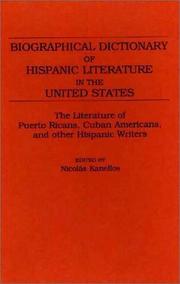| Listing 1 - 4 of 4 |
Sort by
|

ISBN: 0313244650 9780313244650 Year: 1989 Publisher: New York Greenwood Press
Abstract | Keywords | Export | Availability | Bookmark
 Loading...
Loading...Choose an application
- Reference Manager
- EndNote
- RefWorks (Direct export to RefWorks)
American literature --- Cuban American literature (Spanish) --- Puerto Rican literature --- Spanish literature --- Littérature américaine --- Littérature cubaine-américaine (espagnole) --- Littérature portoricaine --- Puerto Rican authors --- Bio-bibliography --- Dictionaries --- Ecrivains portoricains --- Biobibliographie --- Dictionnaires anglais --- Hispanic American literature (Spanish) --- Dictionaries. --- Littérature américaine --- Littérature cubaine-américaine (espagnole) --- Littérature portoricaine --- History and criticism --- Cuban American literature --- United States --- Puerto Rican literature - Bio-bibliography - Dictionaries. --- Puerto Rican literature - History and criticism - Dictionaries. --- American literature - Puerto Rican authors - Bio-bibliography - Dictionaries. --- American literature - Puerto Rican authors - History and criticism - Dictionaries. --- Cuban American literature - Bio-bibliography - Dictionaries. --- Cuban American literature - History and criticism - Dictionaries. --- Spanish literature - United States - Bio-bibliography - Dictionaries. --- Spanish literature - United States - History and criticism - Dictionaries. --- Puerto Rican literature - Dictionaries. --- American literature - Puerto Rican authors - Dictionaries. --- Cuban American literature (Spanish) - Bio-bibliography - Dictionaries. --- Cuban American literature (Spanish) - Dictionaries. --- Hispanic American literature (Spanish) - Bio-bibliography - Dictionaries. --- Hispanic American literature (Spanish) - Dictionaries.
Book
ISBN: 0814765483 9780814765487 9780814765494 0814765491 0814765467 9780814765463 9780814765470 0814765475 0814765491 Year: 2012 Publisher: New York, NY
Abstract | Keywords | Export | Availability | Bookmark
 Loading...
Loading...Choose an application
- Reference Manager
- EndNote
- RefWorks (Direct export to RefWorks)
In Unbecoming Blackness, Antonio López uncovers an important, otherwise unrecognized century-long archive of literature and performance that reveals Cuban America as a space of overlapping Cuban and African diasporic experiences. López shows how Afro-Cuban writers and performers in the U.S. align Cuban black and mulatto identities, often subsumed in the mixed-race and post-racial Cuban national imaginaries, with the material and symbolic blackness of African Americans and other Afro-Latinas/os. In the works of Alberto O’Farrill, Eusebia Cosme, Rómulo Lachatañeré, and others, Afro-Cubanness articulates the African diasporic experience in ways that deprive negro and mulato configurations of an exclusive link with Cuban nationalism. Instead, what is invoked is an “unbecoming” relationship between Afro-Cubans in the U.S and their domestic black counterparts. The transformations in Cuban racial identity across the hemisphere, represented powerfully in the literary and performance cultures of Afro-Cubans in the U.S., provide the fullest account of a transnational Cuba, one in which the Cuban American emerges as Afro-Cuban-American, and the Latino as Afro-Latino.
American literature --- African Americans --- Blacks --- Cuban Americans --- Cubans --- Ethnology --- Negroes --- Cuban American literature (English) --- Cuban American authors. --- Intellectual life --- Ethnic identity --- Black persons --- Black people --- Ethnic identity.
Book
ISBN: 1443887587 9781443887588 9781443885454 1443885452 Year: 2016 Publisher: Newcastle upon Tyne, England : Cambridge Scholars Publishing,
Abstract | Keywords | Export | Availability | Bookmark
 Loading...
Loading...Choose an application
- Reference Manager
- EndNote
- RefWorks (Direct export to RefWorks)
Archival Dissonance in the U.S. Cuban Post-Exile Novel documents a body of emergent US Cuban literature published in Spanish and English beyond the scope and historicity of exile. Focusing on the work of Roberto G. Fernández, Ana Menéndez, and Antonio Benítez Rojo, the book proposes that, rather than reinforce US Cuban exile ethnic identity developed between 1960 and the 1980's, or demonstrate a tendency toward cultural assimilation ("Americanization") over three generations of writers, the discussed historical novels incorporate Caribbean and Latin American archival sources and interpretive...
Book
ISBN: 1438477090 1438477082 1438477104 9781438477107 9781438477091 9781438477084 Year: 2019 Publisher: Albany
Abstract | Keywords | Export | Availability | Bookmark
 Loading...
Loading...Choose an application
- Reference Manager
- EndNote
- RefWorks (Direct export to RefWorks)
"Let's Hear Their Voices brings together works by ten distinguished and emerging Cuban-American writers of the "second generation"--writers who were born between 1960 and the mid-1980s in the United States to Cuban parents who either fled the island after 1959 or have a mixed ethnic background. Called "ABCs" (American-Born Cubans) or "AmeriCubans," these writers experiment with different formal approaches and lace their work with Cuban Spanish to give voice to hybrid identities and cultural legacies within the contemporary multicultural US. An introduction by Iraida H. López identifies key tropes in their poetry, prose, and drama and provides an overview of Cuban-American literature since the 1960s. With both original and previously published pieces by award-winning authors--including President Obama's Second Inaugural Poet, Richard Blanco--the volume makes a welcome contribution to the fields of Latinx and American literature, as well as critical discussions across disciplines about the intersections of latinidad with race, class, gender, and sexuality." --
American literature --- Cuban Americans --- Cuban American authors. --- Cuba --- Cubans --- Ethnology --- Cuban American literature (English) --- Küba --- Guba --- Kkuba --- Republic of Cuba --- República de Cuba --- キューバ --- Kyūba --- Kuuba
| Listing 1 - 4 of 4 |
Sort by
|

 Search
Search Feedback
Feedback About UniCat
About UniCat  Help
Help News
News